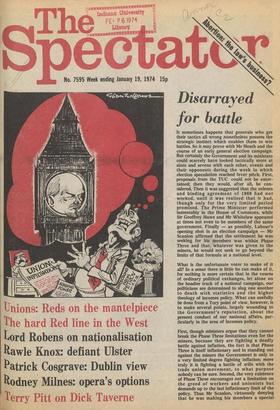Disarrayed for battle
It sometimes happens that generals who get their tactics all wrong nonetheless possess the strategic instinct which enables them to win battles. So it may prove with Mr Heath and the course of an early general election campaign. But certainly the Government and its ministers could scarcely have looked tactically more at sixes and sevens with each other, events and their opponents during the week in which election speculation reached fever pitch. First, proposals from the TUC could not be entertained; then they would, after all, be considered. Then it was suggested that the solemn and binding agreement of 1969 had not worked, until it was realised that it had, though only for the very limited period promised. The Prime Minister performed lamentably in the House of Commons, while Sir Geoffrey Howe and Mr Whitelaw appeared at times not even to be members of the same government. Finally — as possibly, Labour's opening shot in an election campaign — Mr Scanlon affirmed that the settlement he was seeking for his members was within Phase Three and that, whatever was given to the miners, he would not seek to go beyond the limits of that formula at a national level.
What is the unfortunate voter to make of it all? In a sense there is little he can make of it, for nothing is more certain that in the course of ordinary political exchanges, let alone on the headier track of a national campaign, our politicians are determined to slug one another to death with statistics and the higher theology of incomes policy. What can usefully be done from a Tory point of view, however, is to make several points, largely wounding to the Government's reputation, about the present conduct of our national affairs, particularly in the area of incomes policy.
First, though ministers argue that they cannot break the Phase Three limitations even for the miners, because they are fighting a deadly battle against inflation, the fact is that Phase Three is itself inflationary and in standing out against the miners the Government is only to a very limited degree fighting inflation; more truly it is fighting a battle of wills with the trade union movement, to what purpose nobody can be sure. Second, the very existence of Phase Three encourages not a limitation on the greed of workers and unionists but demands up to the last inflationary limit of the policy. Thus Mr Scanlon, virtuously denying that he was making his members a special case, nonetheless insisted that he was going to the limits of Phase Three bargaining. Thirdly, it is extremely difficult to defend a government which, while refusing payment to miners for the arduousness of the toilet their job imPoses on them — a payment which, surely Should be made as a matter of human dignity — on the grounds that such payment would be inflationary, continues itself to pile high the flames of inflation by the most calculatedly reckless public spending of any administration In our history.
It follows from this that Mr Heath's government should be required to answer some searching questions about its own confused Management and mangled sense of priorities. Every stage of the incomes policy has been mismanaged and mishandled; the nation has been deceived as to the extent to which the Government is itself responsible for inflation; and ducks and drakes have been played with words, politics and truth in the course of successive desperate attempts by ministers to extricate themselves from their own morass. But over and above all this it is becoming increasingly clear that — as all true Conservatives have believed for some time — incomes policies are of their nature unworkable. Already, however, we are told that Mr Heath and his men are planning Phase Four, and drawing up the outline of Phase Five. Each such phase leads to further and more divisive Clashes within the nation. Can ministers of this Government ask for a renewed, and perhaps a doctor's, mandate from the people when their Proposal is to continue with something which has already failed, and which is a nonsense Within itself? Now it is true that Mr Heath's government has broken more promises and reversed more policies than any this century except its immediate predecessor. But it is nonetheless the case that Conservatives who voted so enthusiastically for the Prime Minister in 1970 will expect from him during a Campaign at least this admission and this un,dertaking — that he admits the folly of what ,ne has been doing; and that he will set a date ,tor a return to free collective bargaining. Else, It is difficult to see how they could vote for him.



































 Previous page
Previous page